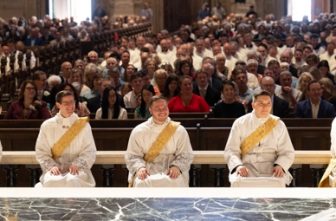
How much did the widow really give with her two small coins? In today’s money, she gave about $2. However, that’s not important. Of true importance was that she gave everything. Contrast this with those that gave much. Some of them were likely motivated to do right by God, but theirs was often a calculated giving, seeing it as a way to build influence and to maintain or improve their social standing.
Jesus called out this hypocrisy to remind us that we often fail to see our earthly possessions primarily as a means to love God and neighbor. Such mistaken thinking can be seen in all aspects of the Church. We see it in the reluctance of some clergy to preach the hard truths. It can be easy for us clergy to think “I can’t sacrifice possible financial gain for my parish by saying something that’s unpopular.” It can also be seen in the faithful, lay and clergy alike, when they determine that they can’t abide by a Church teaching that requires a full giving of themselves, whether that be financially or otherwise. Such concerns are not unfounded. Both finances and reputation are important for mission. Being satisfied with our career, family life and leisure activities is helpful as well.
However, when faith, moral conduct and the complete giving of self are sold out in favor of financial, reputational or other concerns, we not only lose our reason for being in the Church, but we also ironically lose the things we sought to protect. We might keep them in possession, but they lose their value of helping us to get to heaven because we have placed them above the God who reigns in heaven.
Yes, it can be scary, even a bit reckless, to live the Gospel at times, just as it was reckless to give as the widow gave. What good reason was there for her to give not just out of her need, but everything, to contribute a negligible amount to the temple? It can be easy for us to think likewise, that “there’s not much for the Church to gain by my sacrifice.” What we must keep in mind is that Jesus doesn’t need our money. He created all the resources in the universe. What Jesus really wants is our commitment. One of the necessary ways that we show this is by giving our money. This is not to say that we must give enough money to make ourselves destitute, but enough to affect the way we might otherwise be inclined to live.
We only need look at the example of another widow, the one who meets Elijah, to see what God does with small but generous offerings. In this example, too, it might seem that her offering made little difference to God, and would only hurt her livelihood, as she herself said, “when we have eaten (her offering of bread), we shall die.” In the long run, we all die, so why not do something for God, who has given us everything? Both these widows did precisely that; in giving their meager offering wholeheartedly, in full faith, and with no calculation, they gave something inestimably more than their resources. For they left us an example that shall forever inspire us, the pilgrim Church, to abandon ourselves to God. They demonstrated that generous offerings will be joined to the one, perfect and eternal offering of Christ, allowing us to eagerly await a salvation that comes not from money, or reputation, but from faithful, loving action toward God and his Church.
Father Baker is parochial vicar at St. Agnes in St. Paul.
Sunday, Nov. 10
Thirty-second Sunday in Ordinary Time




